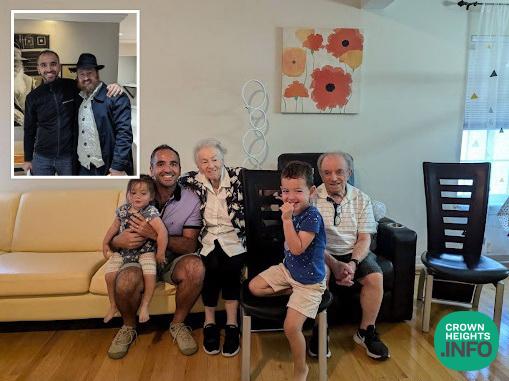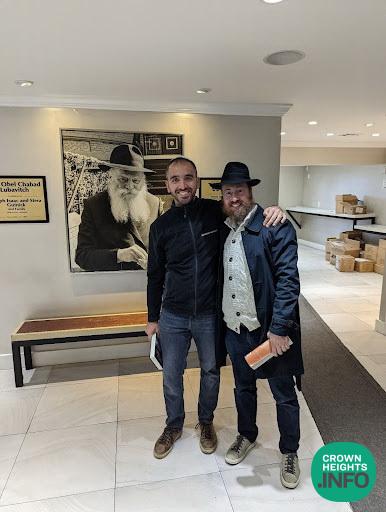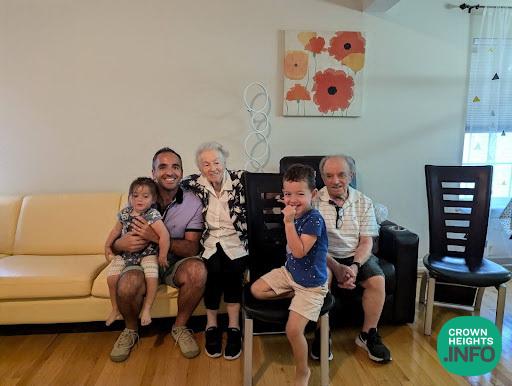
Chassidus Study Helps Tech Professional Apply Torah Insights at Google
by Ed Markovich, as told to Musia Kaplan
My grandmothers taught me the importance of always learning and working on yourself, but it took me a while to recognize inner growth as a profoundly Jewish value. Growing up in the Soviet Union, we thought of our Jewishness as an ethnic identity. Being Jewish meant that my skin was a little darker than the neighbors and my family had high expectations. It had nothing to do with religion.
When I was 11 years old, my family settled in Brooklyn. Later, whilst studying computer science, I became friends with Rabbi Adam Stein, the Chabad Rabbi at Stony Brook University. Chabad was a great place to hang out on Friday nights, but Judaism didn’t yet appeal to me intellectually and I wasn’t interested in spirituality.
In 2019, I got engaged to Jamie. In honor of our upcoming wedding, her parents bought me a tallit and tefillin, along with a Hebrew-English siddur, since I wanted to know the meaning of the words I was saying. I started to wrap tefillin occasionally, which inspired more questions. Chabad.org was an amazing resource for these topics, but I was barely scratching the surface.
When I explained to Rabbi Stein that I was hitting the limits of self-study, he suggested I use JNet to find someone to learn with. That’s how I met Aharon Fehler three years ago. We immediately “clicked” as we have a lot in common—we both live in Long Island, are in our 40s, and work in tech.
In our weekly study sessions, Aharon and I often turn to technology to find analogies for esoteric Jewish concepts. For example, Chasidut teaches that G-d recreates the universe every moment of every day and if he would stop, everything would cease to exist. We compare that to a simulation, like a computer game that has a creator who keeps it running. The analogy makes it easy to grasp this concept, which makes it all the more incredible that our sages understood it millennia ago.
Aharon has been helping me understand the relevance and genius of Jewish ideology. At some point, he encouraged me to subscribe to Chayenu, a weekly publication with English translations and commentary on the Chumash, Tanya, Tehillim, and Rambam. At first, Chayenu simply gave me a structured way to keep up with the weekly Torah readings. But over time, consistent study has changed the nature of my connection with Judaism. I began to see how the wisdom of the Torah could be applied to real-life situations.
When I have an issue on my mind—whether it’s related to work, a relationship, or raising kids—the answer often “randomly” pops up in that week’s parsha. For example, I was coaching a friend at Google who had been told that he needed to become more persuasive in order to get promoted. He was conflicted about this feedback as he associated being persuasive with being superficial and dishonest.
I asked him if he was familiar with the Biblical story of Noah, which happened to be that week’s parsha. He said he was. So I asked him, would it have been “superficial and dishonest” had Noah figured out how to engage the people of his generation to mend their ways and avoid the flood? In fact, it’s precisely the truth and importance of the information Noah possessed that makes his inability to “sell” it all the more tragic. This really helped my mentee. The Biblical case study enabled him to move past his block and recognize that the skills he was being asked to develop had virtuous applications.
I’ve always been a hyper-logical guy. Anything that couldn’t be understood through logic felt irrelevant and unreal. I now recognize that this is an incredibly limiting stance since an overwhelming amount of reality is outside of our ability to understand or even observe. Ironically, logic leads us to understand its own limits. Judaism is incredible precisely because it is the study of how the finite, limited human can engage with the infinite and eternal G-d. This then empowers us to transcend boundaries and constantly climb higher.
The same values I got from my Grandmothers and rely on in my career, I now see as the key to the Jewish “operating system” that sustains growth and enables us to persevere through years of struggle. Perhaps this can explain what our people have achieved—our survival, resilience, and contributions to society.
These days, I strive to make Jewish practice a part of my daily life. I still struggle with how to make prayer meaningful, but I wrap tefillin and say Shema most days. My family happily supports Jewish causes and we belong to two synagogues. But most importantly, we are trying to raise our young children with the Jewish values and traditions that have sustained us for centuries. I want to “upload” the operating system that will enable them to live rich, meaningful, and impactful lives, and to pass it on to subsequent generations.
Download the latest edition of The JNet Connection
JNet pairs volunteers who’ve had the gift of a Jewish Education with Jews from a diverse array of backgrounds looking to learn more. For the mentee, it offers a one-to-one session where they can explore their Jewish heritage at their own pace. For the mentor, a chance to tap into their arsenal of Jewish Knowledge and share it, as a weekly Shlichus.
Make a JNet Chavrusah your Yud Tes Kislev Hachlata, register today, www.jnet.org/learn













